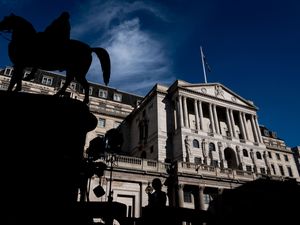Business
Bank of England Faces Close Call on Interest Rates Decision

The Bank of England is expected to maintain interest rates at 4% during its upcoming Monetary Policy Committee (MPC) meeting on October 26, 2023. This decision, however, is shaping up to be a close call as new economic data introduces the possibility of a rate cut.
With inflation figures showing signs of stabilization, economists are divided. While most predict that the Bank will hold rates steady, some, including analysts at Barclays and Goldman Sachs, anticipate a reduction to 3.75%. Recent data revealed that the UK Consumer Prices Index (CPI) inflation remained at 3.8% in September, unchanged from July and August, and contrary to expectations of a 4% reading.
Edward Allenby, senior UK economist for Oxford Economics, noted that the data released since the last MPC meeting may alleviate some concerns regarding persistent inflation. He stated, “On balance, data published since the September meeting should help to slightly ease some of the MPC’s worries about above-target inflation persisting.” Nonetheless, he emphasized that this may not be sufficient to sway a majority of policymakers in favor of a rate cut at this time.
Concerns about sustained inflation remain prominent among MPC members. Matt Swannell, chief economic adviser to the EY Item Club, pointed out that while there are signs of improvement in food prices and energy costs, the overall inflation rate is still nearly double the 2% target. He warned, “Inflation is almost double the 2% target, and the labour market loosening that may be required to get inflation back to target could be losing steam.”
Furthermore, economists suggest that the Bank may prefer to wait for the measures detailed in Chancellor Rachel Reeves’ upcoming Budget on November 26, 2023, before making any cuts. Ellie Henderson, an economist at Investec, commented on the fiscal landscape, stating, “It is looking ever more likely that Chancellor Reeves will have to increase taxes and/or cut spending to meet her fiscal rules and restore a degree of fiscal headroom.” She added that such a tightening of fiscal policy could increase disinflationary pressures, potentially making a rate cut by year-end more likely.
On the opposite side of the debate, Jack Meaning, chief UK economist at Barclays, expressed optimism that the recent inflation data could encourage policymakers to cut rates. He highlighted the combination of inflation trends and slowing wage growth as factors that might bolster the committee’s confidence in easing inflation.
These discussions reflect a significant shift in sentiment among economists. Just weeks ago, many experts believed a rate cut would be unlikely until 2026. This change comes amid ongoing economic pressures faced by millions of mortgage holders who are anticipated to refinance at higher rates. The decision next week will not only impact borrowers but also set the tone for the UK’s economic recovery in the coming months.
-

 Health3 months ago
Health3 months agoNeurologist Warns Excessive Use of Supplements Can Harm Brain
-

 Health3 months ago
Health3 months agoFiona Phillips’ Husband Shares Heartfelt Update on Her Alzheimer’s Journey
-

 Science2 months ago
Science2 months agoBrian Cox Addresses Claims of Alien Probe in 3I/ATLAS Discovery
-

 Science2 months ago
Science2 months agoNASA Investigates Unusual Comet 3I/ATLAS; New Findings Emerge
-

 Science1 month ago
Science1 month agoScientists Examine 3I/ATLAS: Alien Artifact or Cosmic Oddity?
-

 Entertainment5 months ago
Entertainment5 months agoKerry Katona Discusses Future Baby Plans and Brian McFadden’s Wedding
-

 Science1 month ago
Science1 month agoNASA Investigates Speedy Object 3I/ATLAS, Sparking Speculation
-

 Entertainment4 months ago
Entertainment4 months agoEmmerdale Faces Tension as Dylan and April’s Lives Hang in the Balance
-

 World3 months ago
World3 months agoCole Palmer’s Cryptic Message to Kobbie Mainoo Following Loan Talks
-

 Science1 month ago
Science1 month agoNASA Scientists Explore Origins of 3I/ATLAS, a Fast-Moving Visitor
-

 Entertainment2 months ago
Entertainment2 months agoLewis Cope Addresses Accusations of Dance Training Advantage
-

 Entertainment3 months ago
Entertainment3 months agoMajor Cast Changes at Coronation Street: Exits and Returns in 2025









